Our schoolbags are made of 80% recycled polyester. 80% because some materials, like the bottom, which is waterproof faux leather for strength, are not recycled.
Although recycled, it remains polyester (PET) and therefore a plastic. Recycling limits the primary production of polyester but will never replace it, as polyester cannot be recycled infinitely.
Could we use more virtuous materials? An update on our research and experiments on this subject.
What is recycled polyester?
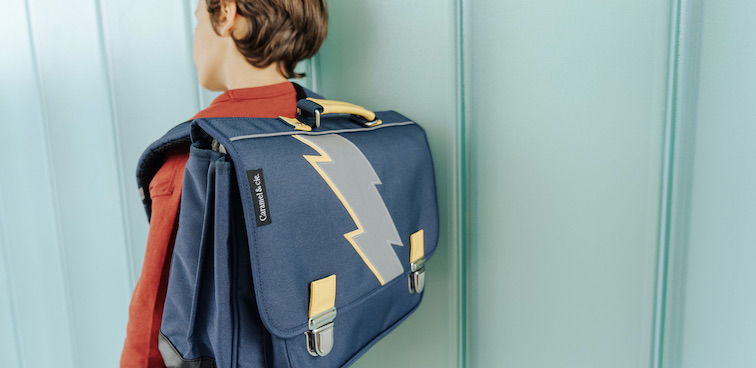
Polyester is manufactured as a fiber for the fashion industry. It makes up 70% of our clothing. It is a plastic material and therefore a derivative of oil. It is made from plastic waste (bottles, clothing, packaging, ...). The recycled polyester, although recycled, is still polyester and therefore a plastic material.
Recycling limits the primary production of polyester but will never replace it, as polyester cannot be recycled infinitely. There is recycled polyester resulting from the depollution of the oceans. It is therefore more virtuous because in addition to limiting production, it reduces the quantity of plastic present in the environment, thus "purifying" it.
Our recycled polyester is GRS certified. It brings you technical, environmental, social and sanitary guarantees.
Why do we use recycled polyester?
We use it in our schoolbags because it is soft, smooth, easy to work with, very strong and economical. It allows us to offer strong schoolbags, it is rigid enough to allow an ergonomic design that preserves the back of the children and our schoolbags remain affordable in terms of cost.
For this we use a premium version of polyester fabric: 900 denier, a tight weave that improves the strength of the fabric. You may not realize it, but our schoolbags are very technical: it takes 132 operations and 72 minutes to make a Caramel & cie. schoolbag.
Why only 80% recycled polyester?
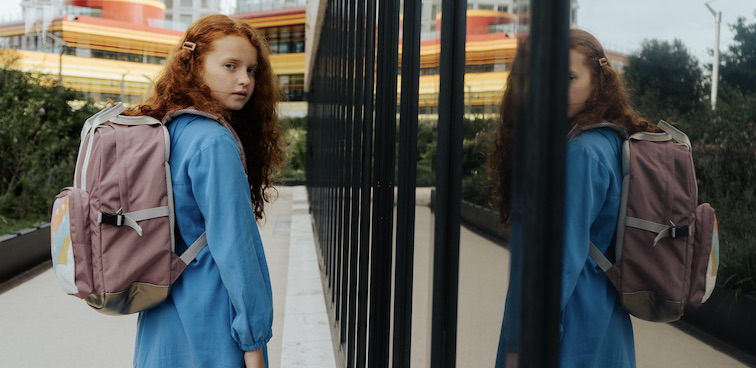 Our schoolbags are made of 80% recycled polyester. 80% because some materials such as the bottom, some tabs and bias are made of imitation leather for their material effect or their resistance to abrasion. They are not recyclable because of their polyurethane coating.
Our schoolbags are made of 80% recycled polyester. 80% because some materials such as the bottom, some tabs and bias are made of imitation leather for their material effect or their resistance to abrasion. They are not recyclable because of their polyurethane coating.
But things are changing and we should soon be able to offer all our collections in 100% recycled material, as recycling technology is making great progress.
Our schoolbags are eco-designed. This means that we try to limit the amount of fabric used as well as the disruptors of recycling that make it complex so expensive or even impossible. All the fabrics and threads used in our schoolbags are made of recycled GRS polyester.
To have 100% polyester in our schoolbags is our objective since it would facilitate their recycling which today is expensive, because of the dismantling (it takes almost as much time to dismantle a schoolbag as to manufacture it!)
Could we use greener materials than recycled polyester?
Each material has its advantages and disadvantages. To produce sustainable we must evaluate multiple criteria.
There are 5 main ones generally accepted:
- Preserve resources and ecosystems,
- Creating decent jobs,
- To offer to the greatest number (at a controlled cost) products which are durable,
- Avoid water pollution,
- Preserve the climate (carbon-CO2 footprint).
Knowing that we have a criterion on which we will be intransigent: the selected materials must allow us to manufacture ergonomic schoolbags because we do not joke with the health of the children.
Despite all our research, recycled polyester remains by far the material that best meets the 5 criteria for a product that is good for the planet.
Let's compare polyester to cotton, for example (although the latter does not make for an ergonomic schoolbag):
- Recycled cotton and polyester have an equivalent carbon impact
- Recycled polyester has a very low impact on drinking water and on soil use and biodiversity, unlike cotton (it takes 6 tons of drinking water to produce 1kg of cotton). In addition, the cultivation of cotton uses pesticides that have an impact on the environment, biodiversity and human health.
- The cotton is partly produced through forced labor, which is not the case for recycled polyester labeled GRS, which guarantees wages and working conditions supervised and verified.
- Recycled polyester can generate micro-plastics unlike cotton.
- A schoolbag generates much less than clothing because the micro-plastics from polyester are mainly produced during the machine washing of our clothes, which does not happen with a schoolbag.
We have also studied linen, wool, hemp, Tencel and Lyocell. Recycled polyester from ocean pollution control is currently too expensive or too far from our production sites. But we are studying the solution.
The choice of materials: a complex issue
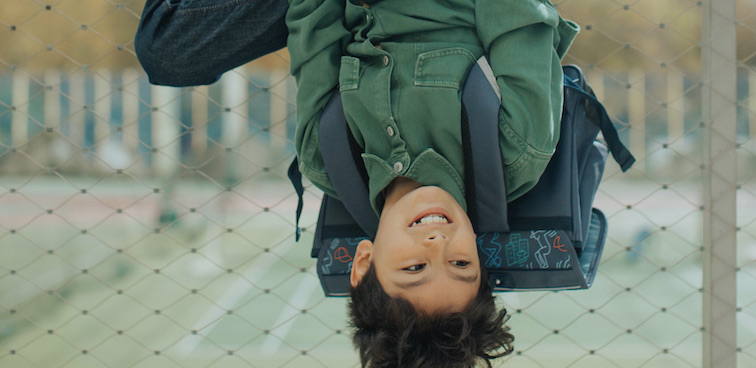
We can see that selecting an ethical material is a complex task and that one should not rely on one's intuitions but seek the help of specialists. Thanks to La Belle Empreinte who helps us in this process.
You also have to take into account external criteria specific to your profession. We design products for children and this gives us responsibilities. The weight of the schoolbag is a social issue so ergonomics and comfort are priority criteria and influence the choice of materials.
And then to be 100% eco-responsible and get a schoolbag at 250 € is easy, but what would be the use of all these efforts if it is for a tiny minority? In the end, the most difficult thing in all this is to remain affordable while checking the maximum number of boxes!
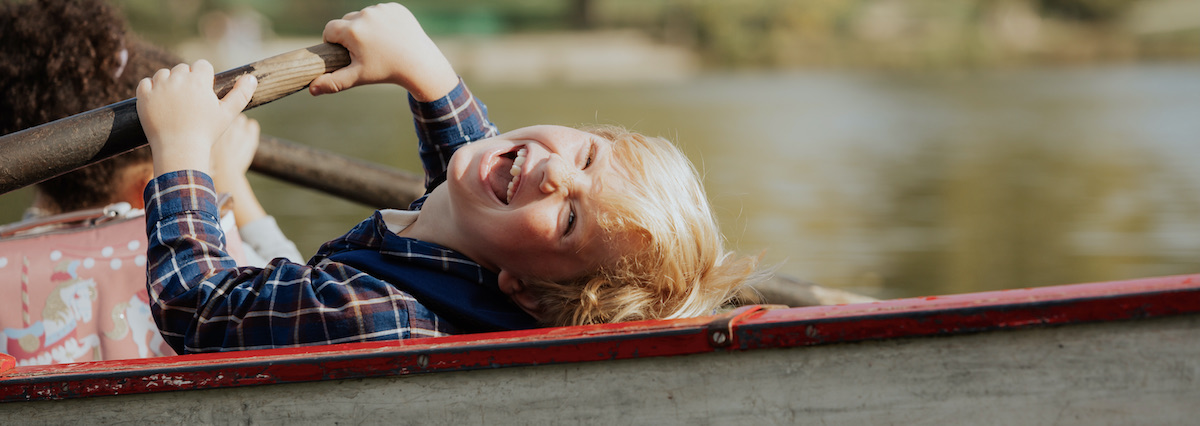


Published the 10/06/2022
Recycled polyester: an eco-responsible solution?

 Our schoolbags are made of 80% recycled polyester. 80% because some materials such as the bottom, some tabs and bias are made of imitation leather for their material effect or their resistance to abrasion. They are not recyclable because of their polyurethane coating.
Our schoolbags are made of 80% recycled polyester. 80% because some materials such as the bottom, some tabs and bias are made of imitation leather for their material effect or their resistance to abrasion. They are not recyclable because of their polyurethane coating.
- Preserve resources and ecosystems,
- Creating decent jobs,
- To offer to the greatest number (at a controlled cost) products which are durable,
- Avoid water pollution,
- Preserve the climate (carbon-CO2 footprint).
- Recycled cotton and polyester have an equivalent carbon impact
- Recycled polyester has a very low impact on drinking water and on soil use and biodiversity, unlike cotton (it takes 6 tons of drinking water to produce 1kg of cotton). In addition, the cultivation of cotton uses pesticides that have an impact on the environment, biodiversity and human health.
- The cotton is partly produced through forced labor, which is not the case for recycled polyester labeled GRS, which guarantees wages and working conditions supervised and verified.
- Recycled polyester can generate micro-plastics unlike cotton.
- A schoolbag generates much less than clothing because the micro-plastics from polyester are mainly produced during the machine washing of our clothes, which does not happen with a schoolbag.

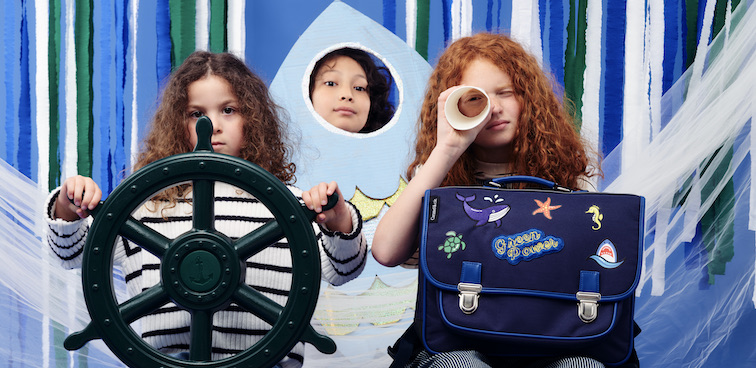
Our schoolbags are made of 80% recycled polyester. 80% because some materials, like the bottom, which is waterproof faux leather for strength, are not recycled.
Although recycled, it remains polyester (PET) and therefore a plastic. Recycling limits the primary production of polyester but will never replace it, as polyester cannot be recycled infinitely.
Could we use more virtuous materials? An update on our research and experiments on this subject.
What is recycled polyester?
Polyester is manufactured as a fiber for the fashion industry. It makes up 70% of our clothing. It is a plastic material and therefore a derivative of oil. It is made from plastic waste (bottles, clothing, packaging, ...). The recycled polyester, although recycled, is still polyester and therefore a plastic material.
Recycling limits the primary production of polyester but will never replace it, as polyester cannot be recycled infinitely. There is recycled polyester resulting from the depollution of the oceans. It is therefore more virtuous because in addition to limiting production, it reduces the quantity of plastic present in the environment, thus "purifying" it.
Our recycled polyester is GRS certified. It brings you technical, environmental, social and sanitary guarantees.
Why do we use recycled polyester?
We use it in our schoolbags because it is soft, smooth, easy to work with, very strong and economical. It allows us to offer strong schoolbags, it is rigid enough to allow an ergonomic design that preserves the back of the children and our schoolbags remain affordable in terms of cost.
For this we use a premium version of polyester fabric: 900 denier, a tight weave that improves the strength of the fabric. You may not realize it, but our schoolbags are very technical: it takes 132 operations and 72 minutes to make a Caramel & cie. schoolbag.
Why only 80% recycled polyester?
But things are changing and we should soon be able to offer all our collections in 100% recycled material, as recycling technology is making great progress.
Our schoolbags are eco-designed. This means that we try to limit the amount of fabric used as well as the disruptors of recycling that make it complex so expensive or even impossible. All the fabrics and threads used in our schoolbags are made of recycled GRS polyester.
To have 100% polyester in our schoolbags is our objective since it would facilitate their recycling which today is expensive, because of the dismantling (it takes almost as much time to dismantle a schoolbag as to manufacture it!)
Could we use greener materials than recycled polyester?
Each material has its advantages and disadvantages. To produce sustainable we must evaluate multiple criteria.
There are 5 main ones generally accepted:
Knowing that we have a criterion on which we will be intransigent: the selected materials must allow us to manufacture ergonomic schoolbags because we do not joke with the health of the children.
Despite all our research, recycled polyester remains by far the material that best meets the 5 criteria for a product that is good for the planet.
Let's compare polyester to cotton, for example (although the latter does not make for an ergonomic schoolbag):
We have also studied linen, wool, hemp, Tencel and Lyocell. Recycled polyester from ocean pollution control is currently too expensive or too far from our production sites. But we are studying the solution.
The choice of materials: a complex issue
We can see that selecting an ethical material is a complex task and that one should not rely on one's intuitions but seek the help of specialists. Thanks to La Belle Empreinte who helps us in this process.
You also have to take into account external criteria specific to your profession. We design products for children and this gives us responsibilities. The weight of the schoolbag is a social issue so ergonomics and comfort are priority criteria and influence the choice of materials.
And then to be 100% eco-responsible and get a schoolbag at 250 € is easy, but what would be the use of all these efforts if it is for a tiny minority? In the end, the most difficult thing in all this is to remain affordable while checking the maximum number of boxes!